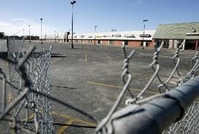Company Profile
Delta's business activity has evolved over the years as economic business conditions dictate the best type of "development opportunities" our company should pursue. The savings and loan crisis of the late 1980's led to the formation of Resolution Trust Corporation (RTC), which was organized in 1989 to oversee the liquidation of failed real estate assets. By 1995, a total of 747 thrift institutions were closed, with total assets of $394 billion. Traditional financing for shopping center development was scarce, so we focused our attention on equity financing for new projects. Fortunately, our company was well positioned with private equity investors, many of which were wealthy family trusts and international investment partnerships ... all of which were astute real estate investors and willing to move quickly for the right deal.
 During the late 1990's and early years of the 21st century, the internet boom led to explosive residential growth and a vibrant economy ... thus, providing a plethora of opportunities for "ground-up" shopping center development. Unemployment was low, retailers were flourishing, and there was an abundant amount of equity and debt available for new development. Our company had developed a unique perspective of shopping center development, and we were also fortunate to have nurtured business relationships with many major tenants. Thus, and although we did not abandon our corporate foundation of providing financial services, we greatly expanded our role in the development process as a "deal maker." During this period, together with a select group of development companies and private equity partners, we developed many "anchored shopping centers" for tenants such as Walmart, Costco, Albertsons, Safeway, Kroger, CVS and other notable retailers.
During the late 1990's and early years of the 21st century, the internet boom led to explosive residential growth and a vibrant economy ... thus, providing a plethora of opportunities for "ground-up" shopping center development. Unemployment was low, retailers were flourishing, and there was an abundant amount of equity and debt available for new development. Our company had developed a unique perspective of shopping center development, and we were also fortunate to have nurtured business relationships with many major tenants. Thus, and although we did not abandon our corporate foundation of providing financial services, we greatly expanded our role in the development process as a "deal maker." During this period, together with a select group of development companies and private equity partners, we developed many "anchored shopping centers" for tenants such as Walmart, Costco, Albertsons, Safeway, Kroger, CVS and other notable retailers.
 However, when the national recession hit in 2007/2008, such development opportunities came to an abrupt halt: foreclosures caused investors to retreat from the marketplace; lenders withdrew to lick their wounds of damaged loan portfolios; and many major retailers closed stores, downsized their operations and ceased new store expansion. These business conditions created a domino effect as many smaller retailers were unable to pay the high rental rates resulting from the prior-years' boom, thus forcing them to close their doors and causing more-and-more foreclosures. This was unquestionably a dark-period for many real estate development firms and investors. But, when one door closes, another opens.
However, when the national recession hit in 2007/2008, such development opportunities came to an abrupt halt: foreclosures caused investors to retreat from the marketplace; lenders withdrew to lick their wounds of damaged loan portfolios; and many major retailers closed stores, downsized their operations and ceased new store expansion. These business conditions created a domino effect as many smaller retailers were unable to pay the high rental rates resulting from the prior-years' boom, thus forcing them to close their doors and causing more-and-more foreclosures. This was unquestionably a dark-period for many real estate development firms and investors. But, when one door closes, another opens.
Today, Delta's primary business is focused on acquisition, finance, leasing and re-development of shopping centers throughout the Western States and the Mountain-West States. No, the development business is not dead, it has simply taken on a different personality, with a different set of development and investment criteria. We like to believe we're on the leading edge of that transition as we focus our attention on second-generation and added-value properties within our expanded trade area, which includes: the Pacific Northwest (Seattle and Portland metro areas); Riverside, San Bernardino and San Diego Counties in Southern California; the Phoenix and Tucson metro areas, and, of course, Las Vegas. We have also greatly expanded tenant relationships in all of these areas, which has caused an even greater geographic coverage as we search for expansion opportunities for those clients.
We now maintain a database of vacant big-box and mid-box stores available for purchase or lease, and we do our best to match these properties with the various retailers we're working with. This business model is not dwindling as our economy improves, it's actually growing as a result of mergers and acquisitions (such as Albertsons with Safeway, Office Depot with OfficeMax, and others), and downsizing of business operations by many retailers (such as Sears, JC Penney, Staples and others). This repositioning and consolidation of stores has created, and will continue to create, new opportunities for retail development, or, if you prefer, Redevelopment.
The business cycle is predictable and repeatable: problems require solutions ... solutions necessitate change ... and change will inevitably cause problems. It has always been, and it always will be.